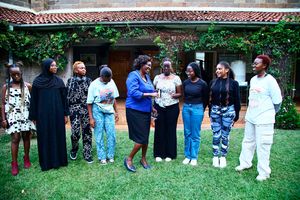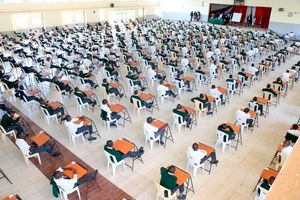
Education Cabinet Secretary Julius Ogamba (second left) briefs President William Ruto on the 2024 KCSE at State House, Nairobi on January 09, 2025.
The 2024 Kenya Certificate of Secondary Education (KCSE) results have revealed a record number of students qualifying for university entry — with 246,391 candidates attaining the minimum university entry grade of C+ and above. This is 45,258 more students than the 201,133 recorded in the KCSE class of 2023.
The high number presents a significant challenge for the government. As the number of students seeking higher education grows, the financial burden on the government has become heavier as it seeks a workable funding models.
The recently quashed model had been presented as the panacea to saving higher education institutions from financial distress. It had stopped automatic sponsorship for tuition fees and made students apply for a scholarship as well as a student loan for tuition and another one for upkeep.
The model had replaced the differentiated unit cost after the government failed to meet its obligation of funding every academic programme at 80 per cent. By the time it was replaced, this had fallen to 48 per cent.
Public universities have also been struggling to pay salaries for both academic and non-academic staff and cumulatively owe various creditors and statutory bodies over Sh70 billion.
Tellingly, Education Cabinet Secretary Julius Ogamba did not announce whether the government will sponsor all the candidates who qualified for university admission or not. Since the 2016 reforms in national examinations, the government has been sponsoring all eligible candidates who score a mean grade of C+ and above.
Mr Ogamba’s silence on the issue speaks volumes of the challenge the government faces. The students are expected to join universities in September 2024 and the government needs to come up with another model to finance higher education if the intended appeal against the High Court judgment does not succeed.
In the years before 2016 when the number of qualifiers would be more than the government budget for higher education, a cut-off point would be set. Those who qualified for admission but did not get government funding would opt for self-sponsored programmes or seek training elsewhere.
The rise in the number of qualifiers marks a 22.5 percent increase compared to 2023, when 201,133 students met the criteria. Additionally, 49.41 per cent of candidates scored C- and above, qualifying for diploma programmess in technical and vocational education and training (TVET) institutions.
The total number of candidates in the examination increased by 7.19 per cent, rising from 903,260 in 2023 to 962,512 in 2024.
“Of the 962,512 candidates who sat the 2024 KCSE examination, 1,693 (0.18 per cent) candidates obtained an overall grade A in the year 2024 KCSE examination compared to 1,216 (0.14 per cent) candidates in 2023. The number of candidates with direct university entry qualification of grade C+ and above was 246,391 (25.53 per cent) in the year 2024 KCSE examination compared to 201,133 (22.27% per cent) in the 2023,” Mr Ogamba noted.
“This increase has been attributed to a new grading system introduced in 2024, designed to align with global assessment practices. Additionally, 49.41 per cent of the candidates scored C- and above, qualifying for diploma programmes under the Technical and Vocational Education and Training institutions,” the CS said.
In February 2024, the government allocated an additional Sh3.98 billion for scholarships under the Higher Education Funding model. However, this funding followed the release of the first tranche of Sh3.9 billion in October 2023, which was intended to cover tuition fees for first-year students.
In addition, the State Department for Higher Education and Research was allocated a total of Sh7.9 billion out of which Sh5.1 billion went to the Education Loans Board for students.
The other Sh2.8 billion was disbursed to the Universities Fund.
Beyond covering tuition fees, there is a pressing need for investment in infrastructure, salaries for faculty, and essential resources to ensure a quality learning environment.
Last year, lecturers went on strike over implementation of a collective bargaining agreement. The unions agreed to a phased payment plan since the government could not afford to pay them at once.
The government now faces an uphill task at a time when both the State and public universities are implementing cost-saving strategies due to ongoing financial constraints.
First and second year university students across the country also face an uncertain start to the new academic semester due to confusion and delays surrounding their funding.
Apart from funding university education, the government will need more money to fund TVET since the number of students has also gone up. Funding basic education is also a challenge to the government.
“The number of candidates attaining a pass grade (grade D+ and above) was 605,774 (62.76 per cent) in the year 2024 KCSE examination compared to 526,222 (58.27 per cent) in 2023,” Mr Ogamba said. These students qualify for diploma training.
In an earlier Interview with Nation.Africa, Treasury Cabinet Secretary John Mbadi said the government was mobilising resources and working closely with the Education ministry to ensure money hits the schools' accounts before January 31. This means that public schools will have to wait longer for funds to run the schools, most of which are also steeped in debt.
“Our priority this year is to pay back the loans, release capitation to schools, pay salaries and release the December allocation to county governments," Mr Mbadi said.












